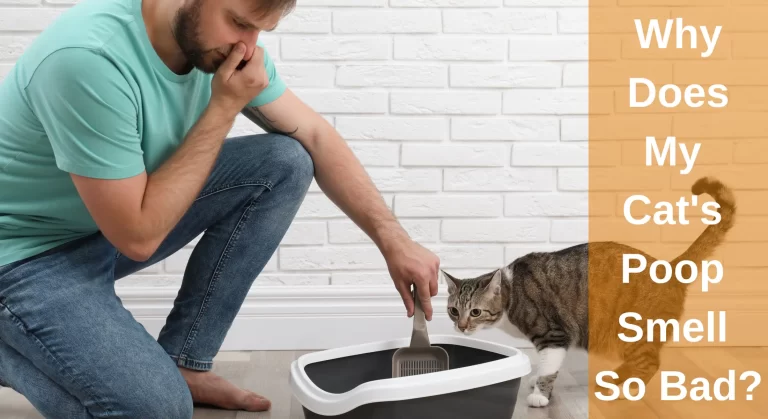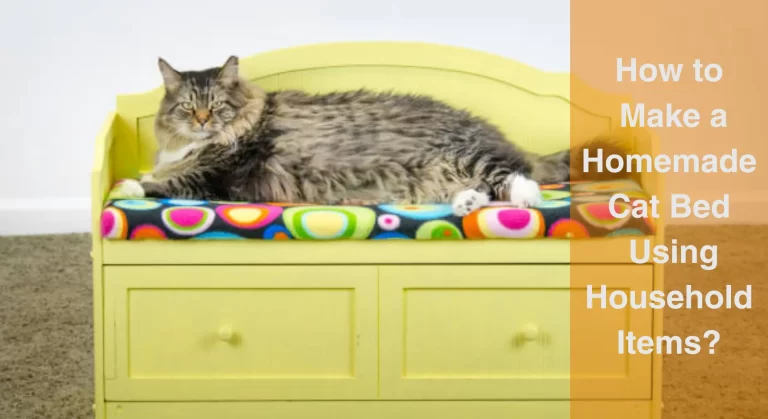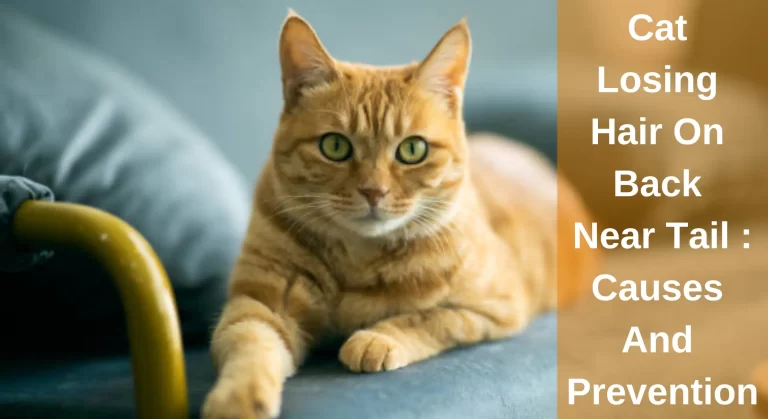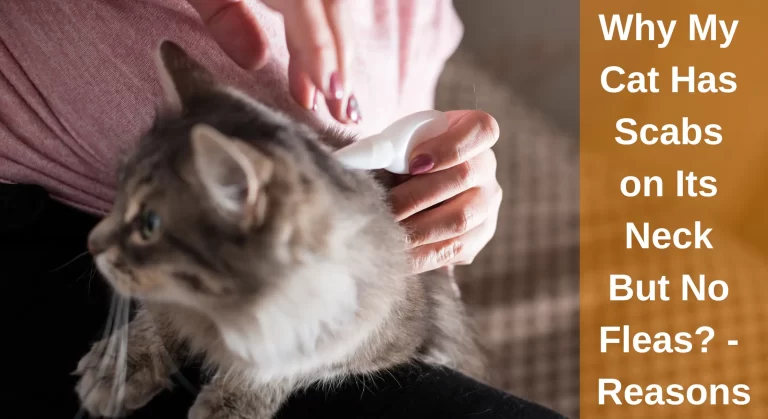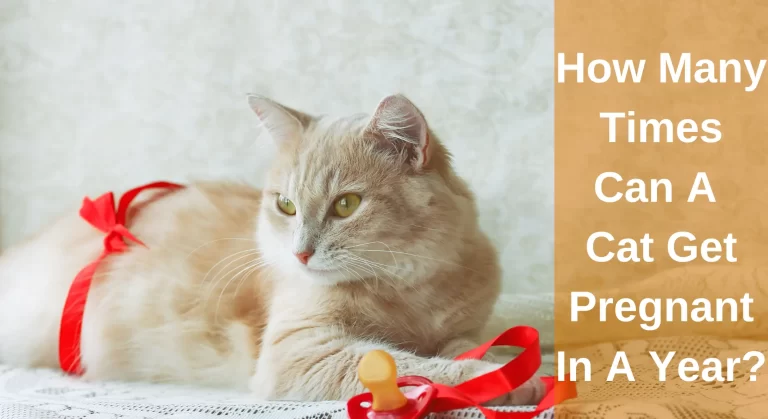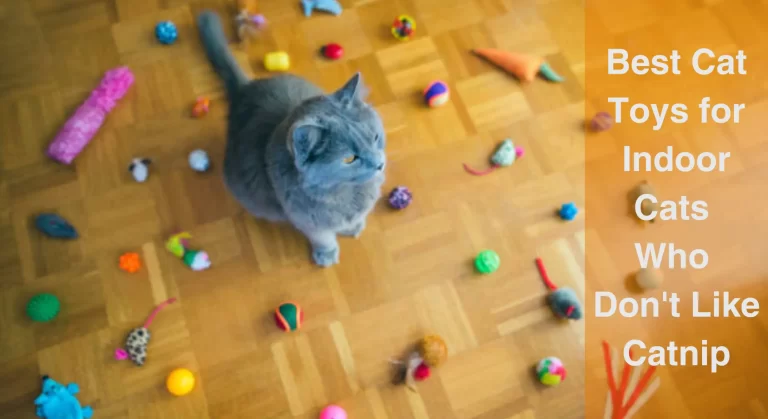Are Snake Plants Toxic to Cats? Things Cat Owners Should Know
If you are a cat owner and love having indoor plants, you might be concerned about the safety of your furry friend around certain plants. Cats are naturally curious creatures, so picking a houseplant requires more thought than simply how it will look and how to take care of it.
One of the plants commonly found in households is the snake plant, also known as Sansevieria. However, before you bring one of these plants home, you might wonder whether it is safe for your cat. Are snake plants toxic to cats?
Snake plants are dangerous for such animals as cats and dogs as well. The plant’s toxins(saponins) will disturb the digestive systems of our furry friends, causing vomiting, diarrhoea, and nausea if they ingest it. Because cats are inherently inquisitive creatures, it is common for them to nibble on the leaves. Consuming the snake plant won’t kill your cat because it only has minute levels of venom.
In this article, we will explore the toxicity of snake plants to cats and provide you with all the information you need to make an informed decision.
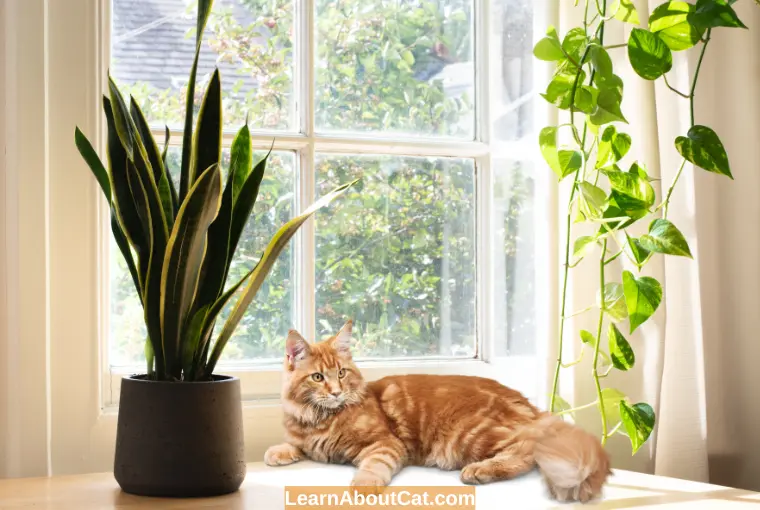
What is a Snake Plant?
Snake plants, also known as Sansevieria, are a genus of plants that are native to West Africa. They are succulent perennials with stiff, upright leaves that can grow up to several feet tall.
Snake plants have several features that make them popular houseplants. They are easy to care for, require little watering, and can thrive in low-light conditions. Additionally, snake plants are known for their air-purifying abilities. They can remove toxins from the air, making them an excellent choice for indoor spaces.
Are Snake Plants Toxic to Cats? Toxic Compounds of Snake Plant
Yes, snake plants are toxic to cats. According to the American Society for the Prevention of Cruelty to Animals (ASPCA). The snake plant has deadly compounds called saponins, which can cause gastrointestinal upset if ingested.
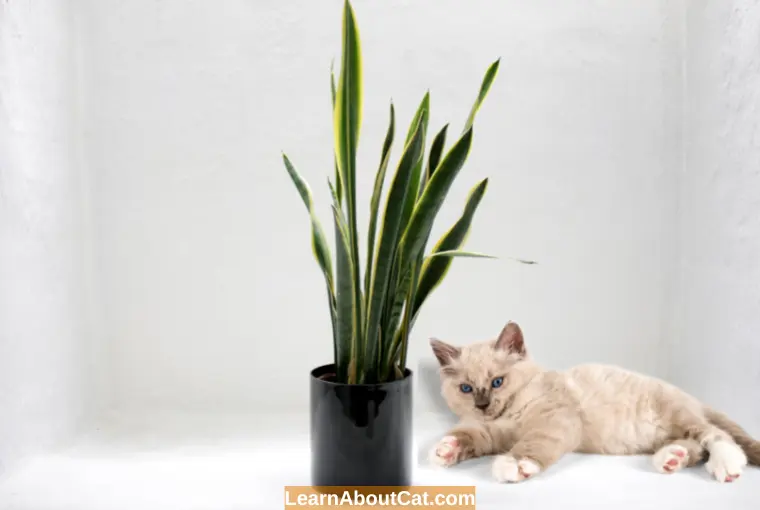
Saponins are present in every part (root, stem, leaves) of the plant, but they are most prevalent in the long, grass-like leaves cats love eating. This produces poisonous saponins and should not be eaten.
However, they are necessary for the plant to survive. The saponins’ inherent defenses against bacteria, fungi, and microbes reduce the possibility that plants may contract various diseases.
Even though these chemicals are quite effective at getting rid of microbes, they are also to blame for the negative effects on cats and dogs. Saponins are purgative substances that, when ingested, cause an increase in bowel movements, which results in diarrhoea and stomach aches.
These digestive issues are made considerably worse by how indigestible snake plants are. The plant pieces may be present in your cat’s stomach, and its digestive system may make vain attempts to break down the plant.
These pieces will be attempted to be regurgitated by your cat, which will only make them feel sicker and make them more likely to vomit.
Also Read: Can Cats Eat Spider Plants?
What Happens When Cat Eats Snake Plant? Causes of Snake Plant Toxicity in Cats
If your cat ingests a snake plant, it may experience symptoms of toxicity. The severity of the symptoms depends on the amount of plant material ingested and the cat’s size. The digestive system is where snake plant ingestion side effects most usually appear.
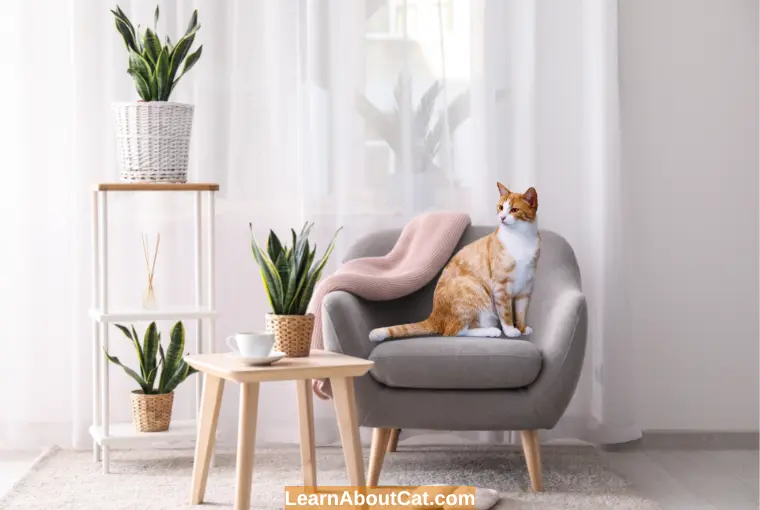
Symptoms of Snake Plant Poisoning in Cats
The symptoms of snake plant poisoning in cats may vary depending on the amount of plant ingested. Common symptoms include:
- Nausea
- Vomiting
- Diarrhea
- Drooling
- Loss of appetite
- Lethargy
- Enlargement of the lips, tongue, and mouth
- Skin irritation
- Gastrointestinal Issues
If your cat has ingested a large amount of the plant, they may experience more severe symptoms, such as:
- Tremors
- Seizures
- Breathing difficulties
- Cardiac arrhythmias
Can Snake Plants Kill My Cat?
Snake plants often result in slight poisoning as opposed to more harmful houseplants like lilies. Consuming the snake plant won’t kill your cat because it only has minute levels of venom.
It is important to emphasise that these toxins are not particularly strong and that snake plant saponin levels are low.
Thus, snake plants are less hazardous than other plants with higher amounts of these chemicals or more strong and severe poisons, such as calcium oxalates.
Therefore, it’s unlikely that snake plants would damage your cat, even if they did contain hazardous elements.
What to Do if Your Cat Eats a Snake Plant?
If you suspect your cat has eaten a snake plant, it’s important to act immediately. The first step is to remove any remaining plant material from your cat’s mouth.

Here are some steps you can take if your cat eats a snake plant:
- Contact your veterinarian: Call your veterinarian immediately and explain the situation. They can guide what to do next and may recommend bringing your cat in for an exam.
- Observe your cat: Monitor your cat closely for any signs of illness, such as vomiting, diarrhea, loss of appetite, lethargy, drooling, or tremors. Note the time and amount of plant material ingested, as this information can help your veterinarian determine the best course of treatment.
- Induce vomiting: If your cat ingested the plant within the past two hours and is not already vomiting, your veterinarian may recommend inducing vomiting to remove the plant material from your cat’s system. Do not induce vomiting at home without first consulting your veterinarian.
- Seek veterinary care: If your cat shows signs of illness or has ingested a lot of plant material, seek veterinary care immediately. Your veterinarian may need to hospitalize your cat for supportive care, such as intravenous fluids and medication to control symptoms. Antihistamines or stomach-soothing drugs may also be used to aid with swelling and open airways. Sloppy or mushy food and help with feeding may be necessary for certain cats.
- Prevent future ingestion: To prevent future ingestion, remove any snake plants from your home or place them in inaccessible areas to your cat. You may also consider using bitter-tasting sprays or other deterrents to discourage your cat from chewing on plants.
It will likely take a day or two for cats who ate snake plants to recover fully. It is quite unlikely that the toxicity of this plant will cause death. Make careful to move the plant to a location within your home where your cat cannot get it.
Remember, prevention is the best way to protect your cat’s health. By preventing your cat from ingesting snake plants, you can avoid potential health issues and ensure your cat stays healthy and happy.
Treatment for snake plant poisoning might be expensive. To avoid high vet care expenditures, immediately purchase pet health insurance.
How to Prevent Your Cat from Eating Snake Plants?
You may use several techniques to prevent your cats from consuming a snake plant. Although you can attempt some precautions, you can never be sure your cat won’t consume a poisonous plant.
Some homeowners chose to remove the snake plant as an additional precaution. The only way to shield your cat from deadly plants growing outside is to keep it indoors, where you have perfect control over their exposure.
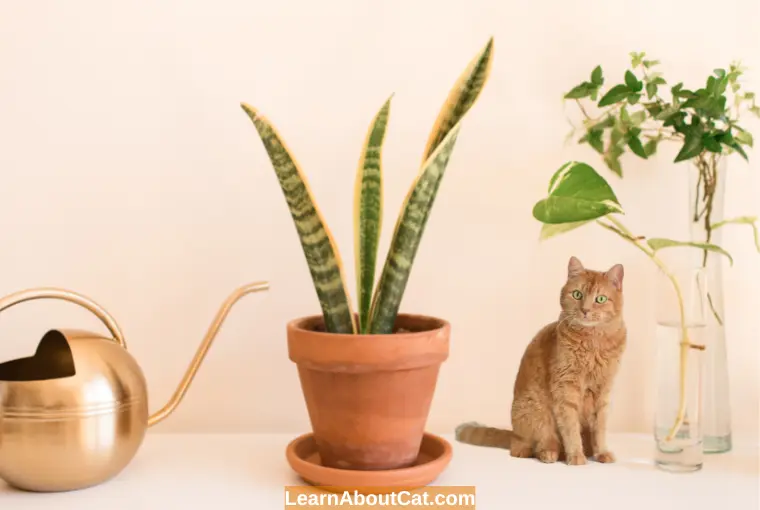
1. First, Move the Plant
The plant should ideally be kept away from your cat’s eating area, furniture, and litter boxes.
One of the safest places for the plant is a room with a lockable door, so you won’t have to worry about your cats when you can’t keep an eye on them. Fortunately, snake plants may thrive in spaces with less natural light because they don’t need a lot of sunshine.
2. In Step Two, Place the Plant on a Stand
You may also try placing the plant on a shelf or a plant stand to make it more difficult for your cat to access it. Because there are so many various sorts of plant stand designs, finding one that matches the rest of your furniture shouldn’t be too difficult.
3. Make the Plant Smell Good
You might attempt to dissuade your cat from the snake plant by surrounding it with odours that are frequently repellent to cats. Since most cats don’t like the scent of citrus fruits, you may use the juice or zest of lemons, limes, or oranges to keep them away from the plant.
As cats don’t like any of those flavours, you may try sprinkling cinnamon or cayenne pepper on the ground.
4. Plant Leaves Can be Sprayed with Pet Spray
Several plant sprays on the market work to stop pets from chewing on particular items. Citrus or bitter apples are the most common flavours. Just keep in mind that cats have a wide range of preferences, so they could accept some sprays.
Because of this, it could take a few tries before you find a spray that successfully keeps your cat away from pests.
Additionally, you need to choose a spray that won’t damage your plant’s leaves. Start by spraying only one area of the plant to see whether it is harmed. Once you’ve discovered a spray that works, use it on the plant’s leaves as frequently as the manufacturer advises.
5. Provide Alternative Chewing Options or Use Cat Grass
Try directing your cat’s attention to cat grass if it enjoys chewing on leaves, as this grass can be easily grown in fields since this could benefit a feline buddy.
Cats often chew on plants because they need to satisfy their natural urge to chew. Give your cat alternative options, such as chew toys or treats, to redirect their chewing behavior.
Common House Plants Cats Can Eat
Even though some typical houseplants are dangerous to cats, plenty of safe and non-toxic options are still available.
1. Pilea Peperomioides
These fascinating plants have several names: Fraudulent Chinese money or an alien plant. This plant requires sunlight. Many people consider this plant a lucky charm that, in addition to its distinctive appearance, gives luck to its owner.
Find Out: Is Christmas Cactus Toxic to Cats?
2. Peperomia Obtusifolia
This plant, also called the baby rubber plant, requires minimal care. With a little attentive care, they will continue producing lovely white flowers all year.
3. Money tree
These bring happiness and prosperity to homes, so they are planted in homes. These trees are popular as eye-catching decor for a place since they typically feature fashionable braided designs.
4. Birds Nest Fern
Birds nest ferns, and squiggly plants provide a humorous touch to any setting. They are generally low-maintenance and may even flourish in toilets since they do well in moist environments and can live in dimly lit areas.
Check Out: Are Ferns Toxic to Cats?
5. Parlour palms
Hardy plants and parlor palms thrive in locations with direct sunlight. Once established in a location, they may continue to grow and reach heights of more than 6 feet.
Interesting Reading: Are Zinnias Toxic To Cats?
Common Indoor Plants That Cats Should Avoid
Indoor plants provide a warm, vibrant atmosphere in homes. Meanwhile, several common varieties are lethal to cats. The owners of cats should avoid the following popular houseplants. Just keep in mind that this is not an exhaustive list, so make sure to check to see whether a plant is non-toxic before taking it home.
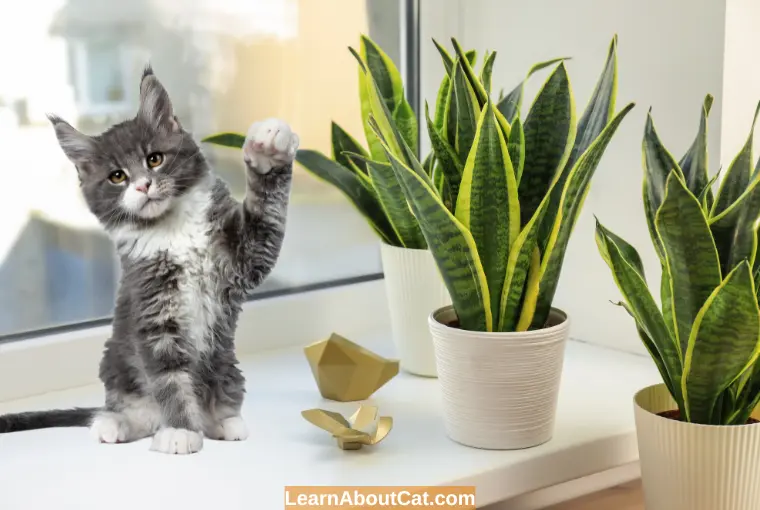
1. Aloe Vera
People can benefit from a variety of health benefits from aloe vera plants. However, cats cannot eat this plant. Saponins and anthraquinones are found. Cats who swallow this plant may have Vomiting and Lethargy.
2. Pothos
These are also called Devil’s ivy. Insoluble calcium oxalates are found in the taro vine Arum Ivy Pothos, monstera deliciosa, and peace lilies, and they cause similar symptoms:
- Orally sensitive
- Severe mouth, tongue, and lip burning
- Drooling
- Vomiting
- Difficulty swallowing
3. Jade Plant
These plants go by many names, including rubber trees. Plants that made money trees. All jade plants are poisonous to cats. If you suspect a cat may have ingested a jade plant leaf, even if its precise deadly composition is yet unknown. Cats who swallow this plant may have depression, nausea, and lack of coordination.
4. Peace lilies
The poisonous components of this plant are insoluble calcium oxalates. Cats who swallow this plant may also have symptoms such as severe mouth, tongue, and lip burning, Drooling, Vomiting, and difficulty swallowing.
Frequently Asked Question
Can snake plants cause permanent damage to cats?
While snake plants can cause severe symptoms in cats, they are not known to cause permanent damage if treated promptly.
How toxic are snake plants compared to other houseplants?
Snake plants are considered mild to moderately toxic compared to other houseplants.
Are all snake plant varieties toxic to cats?
No, some snake plant varieties, such as Sansevieria Trifasciata and Sansevieria Cylindrica, are considered safe for cats.
Can snake plants cause skin irritation in cats?
While ingestion is the main concern with snake plants, they can also cause skin irritation if your cat comes into contact with the sap or leaves.
What are some cat-safe alternatives to snake plants?
Some cat-safe alternatives to snake plants include spider plants, Boston ferns, and African violets.
Wrap Up!
So, do snake plants poison cats? Yes, of course, as the saponins that make up the whole plant cause diarrhea and have purgative effects when ingested. The snake plant is further indigestible and liable to cause stomach problems. If your cat becomes allergic to the herb, its lips and neck can swell. However, consuming a lot of the snake plant is necessary for these effects to be noticeable. When your cat chews on the plant, its lips will be scorched, making it unlikely to desire more.
If you have a snake plant in your home, keep it out of reach and offer your cat safe alternatives to nibble on. If you suspect your cat has ingested a snake plant, seek veterinary care immediately.
Related Posts:
Who is Isabella?
My name is Isabella, and I am a dedicated and knowledgeable cat enthusiast. With years of experience caring for cats and a deep love for felines, I made a mission to help other cat lovers navigate the challenges of cat ownership.

